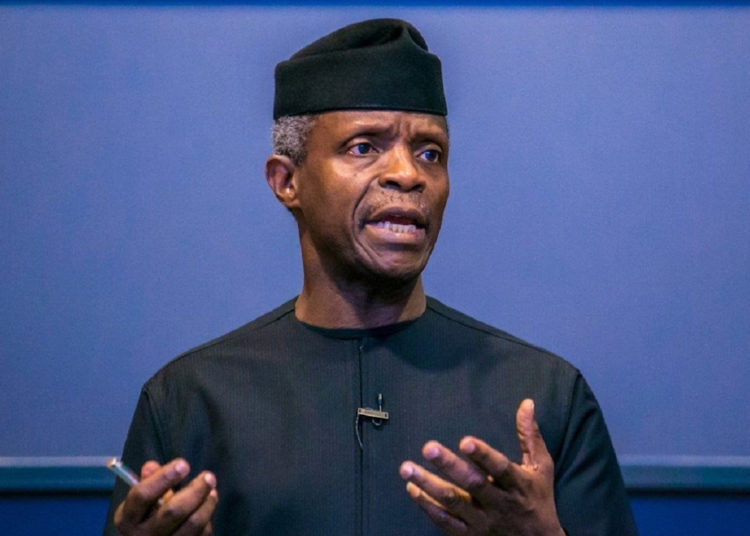Vice President Yemi Osinbajo; former President Goodluck Jonathan; Kano State governor, Abdullahi Ganduje; vice presidential candidate of the APC and former Borno State governor, Kashim Shettima, yesterday brought the role of a deputy to an elected public official, especially vice president and deputy governors, under scrutiny in a bid to make them more viable than mere spare tyres they are considered to be.
Specifically, Osinbajo cautioned those in public office as vice president or deputy governor in elective capacity to be wary of power brokers in the corridors if power.
He, however, observed that holding political office is more of an opportunity to serve and positively impact the lives of millions of people, rather than the prestige that comes with the position.
The vice president, Jonathan, Ganduje, Shetimma and others spoke at the public presentation of a book, deputising and governance in Nigeria, written by the Kano State governor.
Speaking in his capacity as special guest of honour at the event held at NAF event centre, Osinbajo decried the situation whereby hardworking deputies are at the mercy of power brokers who often misrepresent their views and actions by conveying the wrong narrative to the their bosses in order to create disaffection in government.
In his in case, the VP noted that he has always enjoyed a warm relationship with his boss, President Muhammadu Buhari, who, he recalled, had always given him the liberty to pilot the affairs of the country every time he is out of the country.
He disagreed with those tagging deputies as spare tyres, saying their role could be likened to a captain and pilot in an aircraft.
He said, “A thought that runs through the book is that despite the put-downs of the office, being political number 2 is important because the political office is about the lives of millions of people not just about the prestige of office.
“In our constitutional democracy, the effectiveness of the number 2, the vice president, depends a great deal on the trust reposed in him by the president. That is a function of loyalty and it goes both ways as Umar Ganduje points out in his book.”
Describing the relationship between him and his boss – President Muhammadu Buhari, as ideal and exemplary, the VP noted that he had been “more fortunate than others in my relationship with my principal, Mr. President.”
According to Osinbajo, the president “genuinely believes in the role of the vice president.
“When he was leaving on medical leave, the second time, there were a few things that were outstanding to send to him, and he said, “I don’t want you to send me anything, it is your job now, just make sure you do a good job.
“As former President Jonathan said, of his relationship with late Governor Diepreye Alamieyeseigha, the president does not expect me to call him when he is away, he expects that I know what to do and should do it.
“Indeed, once when I called him, he said, ‘Professor, I am on leave, you are supposed to do your job. Do whatever you want to do, when I come back, we will discuss it.’ And that is the way we have always related. I think that is ideal, and I recommend it to principals everywhere.”
On the analogy of the spare tyre widely used to describe the role of the deputy to the president, Osinbajo explained that a better description would be that of the relationship between a captain of a flight and his deputy.
His words: “Imagine a commercial flight with people, including yourself on a plane, there is the captain, and then there is his deputy. The captain flies the plane, but no human being can be completely focused for several hours. So, sometimes he gets up and goes to the bathroom, while the flight is on, his deputy had better be a good pilot otherwise lives are at risk.
“Can you imagine a situation where the captain leaves the cockpit briefly and you hear an announcement from the cockpit, ‘ladies and gentlemen, I am the deputy to the captain, the captain is in the restroom, and I am only a spare tyre and I am not sure what to do now.’ If you are on that plane you will ask God for forgiveness, for expecting that a deputy or vice plays no role.”
Noting that unlike deputy governors, he added that vice presidents have a few more well-defined constitutional roles.
Osinbajo observed that Ganduje’s book is “full of wisdom and wit from a practical politician and erudite social scientist, Governor Umar Ganduje.”
On his part, former President Jonathan called for the legal adjustment to assign clear responsibilities for deputy governors in order to reduce tension in the administrative process.
The former president noted that the relationship between elected political leaders and their deputies had not always been very cordial, and where such deputies hardly succeed their principals.
Jonathan, who also served as deputy governor and later as governor before he became president, however, added that loyalty, patience and cool headedness, discipline, capacity and sound judgement were essential qualities deputy governors must possess to minimize disagreement, suspicion and friction.
He recalled that he and Ganduje had served as deputy governors, and that the Kano State governor was in the best position to author the book.
The former president said, “Having played centrally as both deputy and principal at different times, I would say that I am in a pole position to appreciate the substance of the book and its importance to our democratic and leadership journey.
“Beyond that, there is also the need for a legal adjustment to assign clear responsibilities, other than the ad hoc functions they perform at the behest of their bosses, to the deputy governors, in order to reduce tension in the administrative process.
“In this regard, I also agree with the author that the legal provisions protecting the position of the deputy governor should be strengthened to make the office more functional and secure it from wanton impeachments.”
On his part, Governor Ganduje who is the author of the book said he took the decision to write the book to share his first-hand experience as deputy governor in Kano State under former governor, Rabiu Musa Kwankwaso.
Ganduje who said he had a cordial relationship with his former boss, however, said, “The history of relationships between some governors and their deputies in Nigeria since the First Republic has been that of disloyalty, envy, betrayal, mistrust, ambition, which has over the years divided several states of the federation and negatively affected the development of the people who voted the pair into office.”
According to him, such unsavoury relationships remained a threat not only to the development of the affected states but equally inimical to democracy.
“This should be considered as a matter of national importance because the resentful relationship is unfavourable to democracy, national peace, stability, and development. Because when governors clash with their deputies, the state suffers.
“Despite this, there are equally some deputy governors who have worked well with their principals, which gives a hope that governors and their deputies can indeed work peacefully towards the development of their people and the nation at large.
“This can be done by sticking to the constitutional provisions that clearly stipulate how the duo can work together,” the Kano governor stated.
For vice presidential candidate of the APC and former Borno State governor, Kashim Shettima, loyalty, sincerity, and trust are necessary ingredients to sustain good relationships between governors and deputies.
“Without those ingredients, court jesters will move in and create disharmony. For former governor, once your time is up, you must know that there is a new Sheriff in town,” he said.
Former chairman of the Independent National Electoral Commission and the book reviewer, Prof Attahiru Jega, expressed worry over friction between governors and deputies.
“One wonders, Nigeria being what it is, whether disputes or quarrels between governors and their deputies are or could be over the sharing of booties, expression of natural victory, and assumption of powers,” he said.





